Archaeology
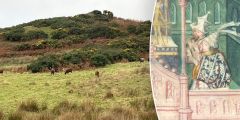
Mar 3rd, 2026 - You can now listen to Fox News articles! An independent researcher believes he's discovered a legendary ruler's burial site — a find that could be the first monumental Viking ship burial identified in England. Steve Dickinson, a British archaeologist, has identified a mound in Cumbria in northwest England that he believes may have been a Viking ship burial, in which elite individuals were laid to rest in a boat or ship. The mound, he believes, may hold the lost grave of Ivar the Boneless, ... [Read More]
Source: foxnews.com
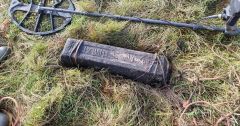
Feb 27th, 2026 - Metal detectorists in western Wales found two lead ingots that date back to the Roman era, a Welsh museum said Tuesday. The pieces are the first of their kind to be found in the region. Metal detectorists Nick Yallope and Peter Nicolas found the pieces while searching land owned by farmer Geraint Jenkins in Ceredigion, according to a news release from Welsh national museum Amgueddfa Cymru. The pair had permission to search and dig on the land. Ceredigion is a coastal area with ... [Read More]
Source: cbsnews.com
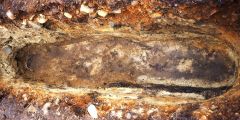
Feb 20th, 2026 - You can now listen to Fox News articles! Workers installing a new sewer line in Scotland unexpectedly uncovered ancient human remains , as well as evidence of a much older settlement. The burial site dates back to the 6th century A.D., according to a Jan. 28 press release from Scottish Water. It was found at Windhill in the Scottish Highlands. Remarkably, archaeologists also found two roundhouses from the Iron Age — which may date back as far as 3,000 years. Excavators also found stone ... [Read More]
Source: foxnews.com
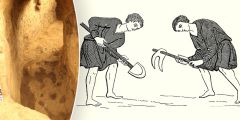
Feb 9th, 2026 - You can now listen to Fox News articles! Archaeologists in Germany recently revealed a secret tunnel from the Middle Ages — a tunnel hidden within a much older burial site. The findings were revealed in a Jan. 29 press release by the State Office for Heritage Management and Archaeology of Saxony-Anhalt (LDA Saxony-Anhalt). The tunnel was found in the Middle Neolithic burial complex near Reinstedt, Germany. Officials estimate the burial complex was used by members of the Baalberge culture ... [Read More]
Source: foxnews.com
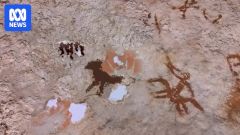
Jan 21st, 2026 - Hand stencils found in an Indonesian cave have been dated to back to at least 67,800 years ago, making it the world's oldest-known rock art. The team behind the discovery suggest the location of the find provides more evidence that Australia's first people arrived around 65,000 years ago. As there is limited evidence of humans in the area during that time period, the team are investigating other limestone caves to gather more evidence of occupation. Tens of thousands of ... [Read More]
Source: abc.net.au
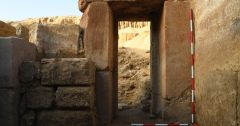
Dec 15th, 2025 - An Italian archaeological mission has discovered the remains of a sun temple belonging to an ancient Egyptian king near Cairo, the Egyptian antiquities ministry said. The temple of King Nyuserre is believed to be from the Fifth Dynasty and the remains were found in the Abusir necropolis south of the Egyptian capital. It is part of a monumental complex dedicated to the cult of the sun god Ra and is one of the few solar temples identified to date. The site was identified as early as 1901 by the ... [Read More]
Source: cbsnews.com

Dec 10th, 2025 - It's quick and easy to access Live Science Plus, simply enter your email below. We'll send you a confirmation and sign you up for our daily newsletter, keeping you up to date with the latest science news. Archaeologists have found the earliest evidence yet of fire technology — and it was created by Neanderthals in England more than 400,000 years ago. Neanderthals were the world's first innovators of fire technology, tiny specks of evidence in England suggest. Flecks of pyrite found at a ... [Read More]
Source: livescience.com
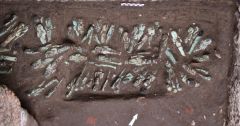
Dec 5th, 2025 - A treasure trove of 225 funerary figurines has been discovered inside a tomb in the ancient Egyptian capital of Tanis in the Nile Delta, a rare find that experts say has also solved a "long-standing archaeological mystery." "Finding figurines in place inside a royal tomb has not happened in the Tanis necropolis since 1946," French archaeologist Frederic Payraudeau told reporters in Paris on Friday. Such a find has also never happened before further south in Egypt's Valley of the Kings near ... [Read More]
Source: cbsnews.com
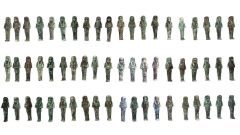
Nov 24th, 2025 - It's quick and easy to access Live Science Plus, simply enter your email below. We'll send you a confirmation and sign you up for our daily newsletter, keeping you up to date with the latest science news. Archaeologists in Egypt have discovered 225 shabtis — figurines meant to act as servants for the deceased in the afterlife — that belonged to the pharaoh Shoshenq III inside a tomb of a different pharaoh. The figurines were found at the site of Tanis, in northern Egypt, in the ... [Read More]
Source: livescience.com

Nov 4th, 2025 - After two decades and an estimated cost of $1bn, the Grand Egyptian Museum (GEM) opened its doors to the public on Tuesday, just a few days after the official opening ceremony on Saturday. Regarded as the world's largest archaeological facility for a single civilisation, the museum is located 2km (1.2 miles) from the pyramids of Giza and 8km (5 miles) from the capital, Cairo. The complex spans nearly 500,000sq metres (5,381,900sq ft) and will house more than 100,000 ancient artefacts from the ... [Read More]
Source: aljazeera.com

Nov 4th, 2025 - It's quick and easy to access Live Science Plus, simply enter your email below. We'll send you a confirmation and sign you up for our daily newsletter, keeping you up to date with the latest science news. QUICK FACTS Milestone: Staircase to King Tut's tomb uncovered When: Nov. 4, 1922 Where: Valley of the Kings, Egypt Who: An archaeological team led by Howard Carter On a sunny morning, Egyptian workers were clearing the sands at the Valley of the Kings, when they uncovered the hint of stone ... [Read More]
Source: livescience.com
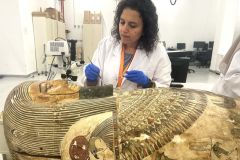
Oct 30th, 2025 - For the first time since the boy king's tomb was discovered in 1922, all the items will stored in one place, a museum director told NBC News. GIZA, Egypt — They're the crown jewels of the Grand Egyptian Museum — two galleries devoted to the ancient pharaoh Tutankhamun . Showcasing more than 5,300 objects from the young king's tomb, including his iconic death mask and glittering royal regalia, the new section of the vast museum here on the outskirts of Cairo is expected to draw ... [Read More]
Source: nbcnews.com
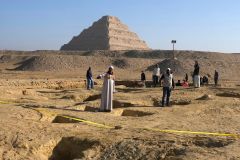
Oct 5th, 2025 - CAIRO (AP) — Egyptian antiquities officials on Sunday said a Pharaonic painting has disappeared from the famed Saqqara necropolis just outside of Cairo, becoming the latest artifact to disappear in a country known for its rich history. Mohamed Ismail, secretary-general of the Supreme Council of Antiquities, said the limestone painting was in the tomb of Khentika in the Saqqara necropolis. The mastaba tomb, which housed the painting, was found in the 1950s, and hasn't opened since 2019, he ... [Read More]
Source: aol.com
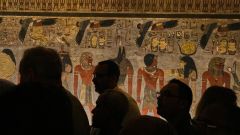
Oct 4th, 2025 - LUXOR, Egypt (AP) — Egypt on Saturday opened a tomb of a pharaoh for visitors after more than two decades of renovation in the southern city of Luxor, as it prepares for the official opening of the Grand Egyptian Museum in Cairo. The huge tomb of Amenhotep III, who ruled ancient Egypt between 1390 B.C. and 1350 B.C., is located on the western side of the famed Valley of the Kings. It was found in 1799 by two people and its contents were looted, including the sarcophagus, Egyptian ... [Read More]
Source: apnews.com
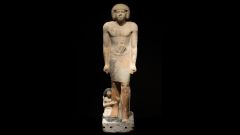
Sep 29th, 2025 - An "unparalleled" funerary statue of an ancient Egyptian man whose name may be Messi has been discovered at the Saqqara necropolis — and it shows him standing with what appears to be his tiny wife and even tinier daughter, who is holding a goose. Measuring just over 40 inches (103 centimeters) tall and carved out of limestone, "the most prominent figure depicted is that of a nobleman standing tall with an advancing left foot representing youth, vitality and strength," researchers wrote in ... [Read More]
Source: livescience.com

Sep 26th, 2025 - You can now listen to Fox News articles! Egyptian archaeologists recently uncovered a hidden harbor at an ancient temple connected to Cleopatra VII – an unexpected find for historians. The Egyptian Ministry of Tourism and Antiquities announced the discovery of the harbor on Sept. 18. It was found at the Temple of Taposiris Magna, about 30 miles west of Alexandria. The temple, built in the Ptolemaic era, was dedicated to Osiris, the Egyptian god of the afterlife. Though the temple ... [Read More]
Source: foxnews.com